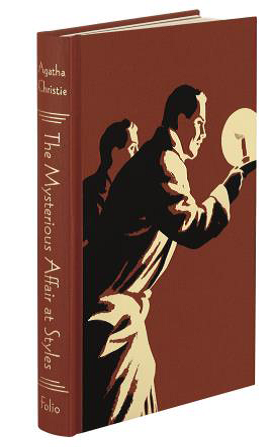The Evolution Of Hercule Poirot In Agatha Christie's Novels

Table of Contents
Poirot's Early Years: The Egocentric Detective
The Belgian's Beginnings:
Poirot's introduction in The Mysterious Affair at Styles establishes his core personality traits. He is undeniably meticulous, boasting a fastidious nature that extends to his personal appearance and his approach to crime solving. His ego is considerable, bordering on arrogance, and he frequently emphasizes his superior intellect and methods, often to the annoyance of those around him. He relies heavily on his celebrated "little grey cells," presenting a picture of a brilliant but somewhat self-absorbed individual.
- Examples of arrogance from The Mysterious Affair at Styles: His condescending remarks towards Captain Hastings, his dismissal of other detectives' methods, and his constant emphasis on his own superiority.
- Early methods and reliance on observation: In The Mysterious Affair at Styles, Poirot’s approach is heavily based on meticulous observation, careful analysis of the crime scene, and the methodical elimination of suspects. He is a master of detail, and his early cases showcase this strength.
Refining his Methods:
While his core personality remains consistent, Poirot's methods begin to evolve subtly in his subsequent early novels. He retains his reliance on observation and deduction but starts to incorporate a greater understanding of psychology and human behavior. The cases themselves become more complex, pushing him to refine his techniques.
- Examples from The Murder of Roger Ackroyd and Peril at End House: In Roger Ackroyd, Poirot faces a more intricate puzzle, demanding a greater depth of psychological insight. Peril at End House introduces a wider range of suspects and motives.
- Comparisons of early cases: Although the fundamental approach remains the same, a comparison of Styles, Ackroyd, and End House reveals a growing sophistication in his investigative techniques and a more nuanced understanding of criminal psychology. This represents an important aspect of the Hercule Poirot evolution.
The Maturing Poirot: Increased Empathy and Vulnerability
Emotional Depth:
As the series progresses, Poirot displays a growing emotional depth. While his ego remains a defining characteristic, he demonstrates increasing empathy and compassion for others. There are instances of genuine concern for the victims and their families, suggesting a more human side beyond the polished exterior. He experiences moments of self-doubt and vulnerability, revealing a more complex inner life than initially presented.
- Examples of emotional growth: His interactions with certain characters in novels like Death on the Nile and Cards on the Table reveal moments of compassion and understanding.
- Influence of cases and relationships: The challenges presented by particular cases and his relationships with individuals like Captain Hastings contribute to his emotional evolution.
Facing Mortality:
As Poirot ages, his awareness of his own mortality becomes increasingly apparent. This awareness influences his approach to cases, his interactions with others, and his perspective on life. He becomes more philosophical, reflecting on his career and the passage of time.
- Examples of awareness of age and time limitations: Later novels show Poirot grappling with the limitations of aging, occasionally mentioning his age or expressing concerns about his remaining time.
- Impact of personal losses: The loss of friends and colleagues impacts him profoundly, affecting his outlook and approach to solving crimes. This contributes to the overall Hercule Poirot evolution.
The Later Years: A Legacy of Wisdom and Acceptance
The Weight of Experience:
In his later years, Poirot’s vast experience shapes his methods and personality. He relies more on intuition and an almost instinctive understanding of human nature. His deductions become swifter, more insightful, often based on a deep understanding of the subtle nuances of human behavior, rather than just the purely logical.
- Examples from later works highlighting his mature approach: In novels like After the Funeral and Hallowe'en Party, his approach is marked by increased intuition and a deeper understanding of human motivation.
- Reflections on his career and life choices: Poirot begins to reflect more introspectively, contemplating his career choices, his successes, and his failures. This self-reflection shapes his approach to his final cases.
Curtain Call:
Curtain, Poirot's final case, serves as a powerful culmination of his journey. It provides a fitting conclusion to the Hercule Poirot evolution, showcasing his acceptance of mortality and legacy. The novel is infused with a sense of finality, reflecting on his life's work and his place in the world.
- Key moments from Curtain highlighting Poirot's acceptance: Poirot's approach to his final case and his reflections on his life show a profound acceptance of his mortality and the inevitability of death.
- Thematic resonance of his ending: Poirot's final case provides a satisfying and poignant conclusion, highlighting his wisdom, acceptance and the lasting impact of his career.
Conclusion:
The Hercule Poirot evolution is a testament to Agatha Christie's masterful storytelling. From the initially arrogant and self-absorbed detective in The Mysterious Affair at Styles to the wise and accepting figure in Curtain, Poirot undergoes a remarkable transformation. This evolution, marked by increased empathy, vulnerability, and a profound understanding of human nature, adds another layer of complexity and intrigue to this beloved character, enhancing his enduring appeal. The Hercule Poirot evolution is a journey worth exploring. Delve into Agatha Christie's novels to witness this fascinating transformation firsthand! Share your thoughts on Poirot's development and your favorite novels featuring the celebrated detective. What aspects of the Hercule Poirot evolution resonate most with you?

Featured Posts
-
 Slowdown In Uk Luxury Exports To The Eu A Brexit Consequence
May 20, 2025
Slowdown In Uk Luxury Exports To The Eu A Brexit Consequence
May 20, 2025 -
 Schumachers Comeback A Pointless Venture Due To Ignored Red Bull Advice
May 20, 2025
Schumachers Comeback A Pointless Venture Due To Ignored Red Bull Advice
May 20, 2025 -
 Nintendos Legal Action And The Ryujinx Emulator Shutdown
May 20, 2025
Nintendos Legal Action And The Ryujinx Emulator Shutdown
May 20, 2025 -
 Investigating Ftv Lives Hell Of A Run A Critical Analysis
May 20, 2025
Investigating Ftv Lives Hell Of A Run A Critical Analysis
May 20, 2025 -
 Historic Burnham And Highbridge Photos Now Accessible Archive Launch
May 20, 2025
Historic Burnham And Highbridge Photos Now Accessible Archive Launch
May 20, 2025
